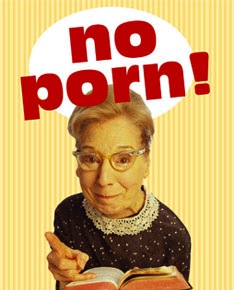A growing consensus is beginning to emerge in opposition to David Cameron’s online porn ban, following the Prime Minister’s announcement of the controversial proposal at the end of last month. The restriction, which would require UK internet service providers (ISPs) to censor pornographic sites by default, will block access to these sites to all UK internet users until they specifically choose to opt out. This way, Cameron argues, the children of Britain will be safeguarded from “corroding influences” online.
Without even addressing the Government’s presumption to know which influences are “corroding” and which are not, as The Libertarian’s own Kacper Zajac did so well two weeks ago, many internet industry leaders are stepping up to condemn Cameron’s proposal for being simply ineffectual.
“It’s an absolutely ridiculous idea. It won’t work,” insisted Wikipedia founder Jimmy Wales, in a statement to the press. “When we use cases of a pedophile who’s been addicted to child porn videos online, you realize all that Cameron’s rules would require him to do is opt in and say ‘Yes, I would like porn please’.”
Considering the relative ease with which an internet user in the UK would be able to circumvent these restrictions, as Mr. Wales has pointed out, it is doubtful whether the infringement of civil liberties involved in the proposal can ever be justified. The ban, even though it takes the form of an opt-out system, will still deny large volumes of traffic to countless legitimate sites, and may hamper online businesses, political advocacy groups, and social media. It is widely believed that under such systems, many people choose not to opt out for the sole reason of not wanting to make the effort. For many internet users, default settings will be accepted as harmless, and removing them may not seem worth the trouble. But are they truly harmless?
Far from banning only pornographic content, David Cameron’s proposed internet restrictions will ban a wide spectrum of content that the Government deems dangerous. According to Jim Killock at the Open Rights Group, sites containing “esoteric content”, “alcohol”, “web forums”, and “extremist related content”, among other things, will also be restricted. Now that the thin end of the wedge is in place, there is a clear risk of its being grown in the name of other social goals, beyond merely protecting the children. Some readers may already be familiar with the ways Symantec has systematically blocked access to anti-feminist websites with debatable accusations of “hate speech”, and many libertarians will be familiar with the ways evidence of police brutality and government sponsored violence have been censored for “dangerous content”. By restricting freedom of the press in this way, the Government is liable to become less accountable to the British public.
Despite this growing controversy, David Cameron remains convinced that his opt-out proposal is superior to the ‘active choice’ model favoured by the internet industry itself. On an active choice model, rather than having to opt out of restrictions on content the Government deems inappropriate, UK internet users will have the option to opt in voluntarily. In this way, those households that wish to restrict their own access to the internet will still be free to do so, but the many millions of users who would not otherwise choose to restrict their internet access will not be subjected to it by default. With such an uncontroversial option already proposed, why does Mr. Cameron feel so obligated to go so far beyond what has been asked of him?
In order to quash the Prime Minister’s authoritarian proposals, libertarians must keep up the pressure against this censorship programme. Spearheading this effort, Open Rights Group has launched a petition on their website, asking David Cameron to “Stop Sleepwalking the UK into Censorship”. Fortunately, they are not alone. The British public is outraged by Cameron’s proposal, and at service providers Andrews and Arnold Ltd, this public sentiment is echoed loud and clear.
“Sorry, for a censored internet you will have to pick a different ISP or move to North Korea.”
“Is that a good enough active choice for you Mr. Cameron?”


Great article. I think the “opt-in” program makes far more sense than “opt-out.” It’s terrible that the government is using shaming to try to curb behavior.
Thing is, Mr Whale’s statement is irrelevant. The opt-out blocker system is to prevent children accessing the content, not to prevent paedophiles accessing it. This system can still be libertarian as long as the ISPs aren’t forced to administer it, and as long as the government can’t access information about who has access to which content, without a warrant (or the ISPs are allowed to provide access without keep records of users’ details).
Simply asking ISPs to make it easier for parents to block questionable content isn’t censorship, it’s just making it easier for parents to make steps to protect kids, on the basis that many parents wouldn’t now how to do it without this kind of blanket blocker with easy access.